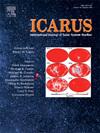New constraint on Europa’s ice shell: Magnetic signature from the ocean
IF 3
2区 物理与天体物理
Q2 ASTRONOMY & ASTROPHYSICS
引用次数: 0
Abstract
Jupiter’s icy moons are believed to host subsurface liquid oceans, and among them, Europa stands out as one of the most promising candidates for extraterrestrial life. Yet, the processes driving oceanic flows beneath its ice shell, as well as the factors controlling the thickness of this ice, remain incompletely understood. One especially distinctive feature of Europa is that its salty ocean is electrically conducting and thus influenced by Jupiter’s time-varying magnetic field, which is believed to drive a large-scale zonal flow. Here, we examine how this magnetically-induced jet affects both the heat flux and the dynamics of the convective flow within Europa’s ocean. We first show that the magnetically-driven jet efficiently transports heat in stably stratified regions near the top of the ocean, and may alter the expected convective scaling laws in deeper layers. Second, by analysing the latitudinal distribution of heat flux and relating it to ice-thickness variations, we make predictions that can be compared with current observations. In anticipation of the upcoming JUICE and Europa Clipper missions, we discuss how improved measurement precision could help further constrain the ocean’s properties and refine our model-based forecasts.
对木卫二冰壳的新限制:来自海洋的磁信号
木星冰冷的卫星被认为拥有地下液态海洋,其中,木卫二是最有希望存在外星生命的候选者之一。然而,驱动冰壳下海洋流动的过程,以及控制冰层厚度的因素,仍然不完全清楚。木卫二的一个特别特点是,它的咸水海洋是导电的,因此受到木星随时间变化的磁场的影响,而木星的磁场被认为会驱动大规模的纬向流。在这里,我们研究了这种磁感应射流如何影响木卫二海洋内的热通量和对流流动的动力学。我们首先证明了磁驱动射流在海洋顶部稳定分层区域有效地输送热量,并可能改变深层预期的对流标度规律。其次,通过分析热通量的纬度分布并将其与冰厚变化联系起来,我们做出了可以与当前观测结果进行比较的预测。在即将到来的JUICE和木卫二快船任务中,我们讨论了提高测量精度如何有助于进一步限制海洋的性质,并改进我们基于模型的预测。
本文章由计算机程序翻译,如有差异,请以英文原文为准。
求助全文
约1分钟内获得全文
求助全文
来源期刊

Icarus
地学天文-天文与天体物理
CiteScore
6.30
自引率
18.80%
发文量
356
审稿时长
2-4 weeks
期刊介绍:
Icarus is devoted to the publication of original contributions in the field of Solar System studies. Manuscripts reporting the results of new research - observational, experimental, or theoretical - concerning the astronomy, geology, meteorology, physics, chemistry, biology, and other scientific aspects of our Solar System or extrasolar systems are welcome. The journal generally does not publish papers devoted exclusively to the Sun, the Earth, celestial mechanics, meteoritics, or astrophysics. Icarus does not publish papers that provide "improved" versions of Bode''s law, or other numerical relations, without a sound physical basis. Icarus does not publish meeting announcements or general notices. Reviews, historical papers, and manuscripts describing spacecraft instrumentation may be considered, but only with prior approval of the editor. An entire issue of the journal is occasionally devoted to a single subject, usually arising from a conference on the same topic. The language of publication is English. American or British usage is accepted, but not a mixture of these.
 求助内容:
求助内容: 应助结果提醒方式:
应助结果提醒方式:


